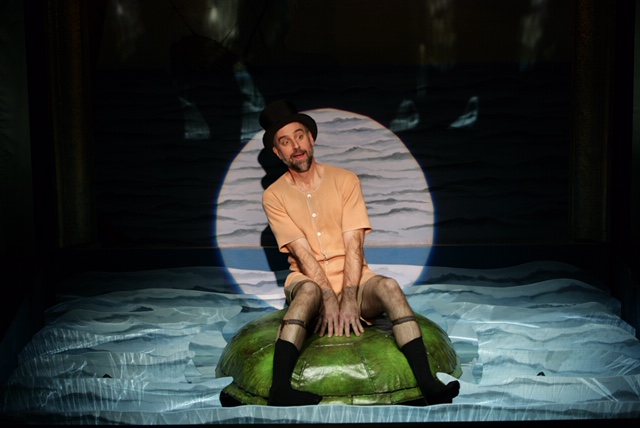It’s not unusual to see Donald Margulies hanging out at a cafe in downtown New Haven, or dashing to a class at Yale University or attending an opening night at Long Wharf Theatre or Yale Rep.
The Pulitzer Prize and Tony Award-nominated writer and his wife Lynn Street, a retired clinical scholar and internist, have lived in their adopted city for more than 35 years.

They first arrived in the 1980s when Street was studying at the Yale School of Medicine, but then returned to New Haven after her residency was completed at New York’s Bellevue Hospital.
“I grew up in Brooklyn and spent my 20s in Hell’s Kitchen in a railroad flat on 47th Street,” Margulies says over a cup of hot chocolate at Atticus Bookstore Cafe on a recent spring afternoon, shortly before teaching an undergraduate class in English and theater studies at Yale.
“I moved there in 1979 and the rent-stabilized apartment was $230 a month, but when it came time to think about having a child we could not imagine [doing that] and schlepping up three flights of stairs all the time in that apartment. It was just too depressing. We wanted space, we wanted a dog, and we found that we missed New Haven.”
Street received a research fellowship and established a practice here, and found it was also the right place to raise their son Miles, who is now 27 and living in Los Angeles.
“We love living in New Haven and have had a wonderful life here,” Margulies says. “It’s been conducive to work, with just enough distractions and with my affiliation with Yale.”
Indeed, Margulies – a lean, soft-spoken, thoughtful, white-haired man in tweed – could be typecast as the “professor/writer” that he plays in real life.
Away from the urban angst and theater-centric focus of midtown Manhattan, most of his friends here have nothing to do with show business. “I don’t mind being the only playwright in my circle of friends. It’s a good mix.”
The Writer of Relationships – And Then Some
His friends were the inspiration for “Dinner with Friends,” a drama of contemporary marriage and friendships set in suburban Connecticut. It brought Margulies the Pulitzer Prize for Drama in 2000 after two earlier plays – “Collected Stories” and “Sight Unseen,” both dealing with the complex relationships of artists – were finalists for the honor. The following year, Margulies’ play was aired as a television movie starring Andie McDowell, Dennis Quaid and Greg Kinnear.
His play “Time Stands Still,” which explores the effect of traumatic events on relationships, was nominated for a 2010 Tony Award for Best Play. “Mr. Margulies is gifted at creating complex characters through wholly natural interaction, allowing the emotional layers, the long histories, the hidden kernels of conflict to emerge organically,” wrote Charles Isherwood in The New York Times. “His dialogue throughout … crackles with bright wit and intelligence.”
His latest stage work, “Long Lost,” brings him back to a family dynamic that marked some of his earlier work: “The Loman Family Picnic,” and “Brooklyn Boy.” It begins performances in May at the Manhattan Theatre Club (MTC), his artistic home in New York which has premiered many of his works, including his last one, “The Country House” in 2014.
The play features Alex Wolff (of the film “Hereditary”), Kelly AuCoin (of TV’s “Billions” and “The Americans”), Annie Parisse (of “Friends from College”) and Lee Tergesen (of “Oz”).
“Long Lost” centers on the unexpected visit of an estranged sibling to his wealthy younger brother’s home, raising questions of filial responsibility that metaphorically reflects to a wider world.
MTC, with Margulies’ input, describes it as “a funny, unsettling, ultimately moving play about the limits of compassion and filial obligation. When troubled Billy appears out of the blue in his estranged brother David’s Wall Street office, he soon tries to re-insert himself into the comfortable life David has built with his philanthropist wife and college-age son. What does Billy really want? Can he be trusted? And how much can family bonds smooth over past rifts?”
“Everything is autobiographical,” says Margulies when asked if there were aspects of his own life in the play. “But is this about the relationship between me and my brother? No. Incidentally, my brother loves this play.”
It took a while before the work was fully developed, however, because Margulies was busy with a television project.
“For two-and-a-half years, I was doing a mini-series about Andrew Jackson for HBO that eclipsed everything else on my plate,” he says. That mini-series is now dead, he says regretfully but without malice.
“I’ve written a lot of screenplays and some of them are big, but nothing on the scope of what this Jackson work was, which was one of the reasons I relished it so much,” he says.
But he’s used to screenplays being developed and then shelved or finding a new life in another writer’s hands. Before the Andrew Jackson project, he worked on an adaptation of Jeffrey Eugenides’ Pulitzer Prize-winning novel “Middlesex,” also for HBO.
It’s also not the first time he worked for television. In the 1980s, at the start of his career, he wrote an afterschool special called “Divorced Kids’ Blues.” Also in the ‘80s, he was under contract for Norman Lear’s company to develop new pilots for television. In addition, Margulies was briefly a producer-writer for the short-lived television series “Baby Boom.”
More satisfying was his work in film, specifically his critically acclaimed screenplay for the 2015 indie film “The End of the Tour” – a compelling portrait of novelist David Foster Wallace, starring Jason Segel and Jesse Eisenberg – which Margulies also executive produced and his former student James Ponsoldt directed.

Back to the Boards
Margulies says he’s “thrilled” to be back in the theater – at a venue that has been his artistic home for decades, and with a director who has been a close collaborator for years, Daniel Sullivan.
At 64, Margulies is now one of the youngest of a senior generation of living American playwrights, which includes Terrence McNally, John Guare, David Rabe, Christopher Durang, Paula Vogel, John Patrick Shanley and David Mamet. But he’s also at the stage of his career when he is seeing his early and mid-career plays being revived.
“I’m one of the alter kockers,” he says, laughing at the Yiddish word meaning a crotchety old man. “And that’s shocking to me but also kind of great. The not-so-great thing about it is that I’m old news – and that’s fine. It’s the natural order of things. I don’t mind being in a senior position.”
Much of that pleasure comes from teaching, first at the Yale School of Drama in the 1990s and now for undergrads, eager to learn what the veteran writer has to share.
One is the lesson of patience. Margulies had been writing plays, receiving grants and commissions, even having productions for 10 years before his eighth play – the break-out “Sight Unseen” in the early 1990s – finally gave him the star writer spotlight, and an Obie Award for the off-Broadway production.
Another lesson is the openness to try new things. A commission to write a play for young audiences resulted in “Shipwrecked! An Entertainment: The Amazing Adventures of Louis de Rougemont (as told by himself),” which was presented at New Haven’s Long Wharf Theatre. That turned out to be one of his most popular works.
Margulies recently returned from Florida where he was on a writers’ retreat working on a new play, tentatively called “Lunar Eclipse.” Again he steps out of the box by telling a story of an older farm couple watching the lunar eclipse.
He says he also enjoys seeing his earlier plays revived.

“People ask me when I see something that I’ve written a long time ago, like ‘The Model Apartment,’ do I have the urge to rewrite it, and my response to that is no,” he says. “In fact, I’m jealous of that writer because it’s a kind of messy play and I [later] became more meticulous about writing. But in that play, for example, I was working out all kind of things about fantasy and dreams and voice and direct audience stuff. One of the things that happens with [career] recognition is that you become more self-conscious, not less. So with this new play, the assignment I gave myself was, well, just write a play. Just write it.
So the writing now is a little messier, a little exploratory in places, and I’m just going to let it happen.”






More Stories
Wadsworth Atheneum Museum of Art: (Un)Settled Art Exhibition Moves Beyond Classic Landscapes
On Stage and Off, With Photographer James Meehan
FALL ARTS PREVIEW